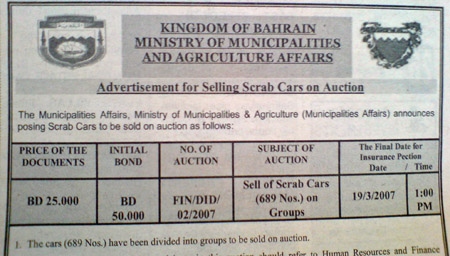
Try to find the number of mistakes in this advert placed in today’s Gulf Daily News by the Ministry of Agricultural Affairs and Municipalities.
This should keep you busy for a couple of days until I come back from Doha!
An Arab man's attempt at bridging the cultural gap and trying to make a difference. Failing a lot. Succeeding once in a while.
Comments
I’m too lazy to find the number of errors, but I wonder…
Scarab cars? Do they come with mummies in the trunk? Perhaps a Pharaoh as a passenger?
I don’t know what a scarb car is, but I didn’t know they were posers. 😆
Spelling and translations are not strong within Municipality
or other government organizations. I think people try to spell phonetically. There are some funny sign boards around town.
It is amusing – in a good way.
Tracy,
For native Arabic speakers, it is difficult for them to pronounce p and is often pronounced like b. I think this is why they spelled scrab instead of scrap. I am not certain but I don’t think p exists in Arabic…
At least their mistakes are in a language other than their own, give them a break.
Ever watch Jay Leno? two nights ago he showed a restaurant ad in America advertising …..”eat children free”
Can we talk: Lighten up dude, we’re not deriding them for their errors (and I made my own, misreading “scrab” as “scarab”). I would bet that plenty of Arabic speakers make fun of the mistakes non Arabic speakers make when writing and speaking the language as well. It happens everywhere. That mistake you saw looks like someone whose language has a Verb – Subject – Object word order (It’s not always clear if the person writing an advert is a native speaker of English or not, with all of the different peoples we have here).
I even tease my relatives when they use he and she interchangeably (as in Filipino languages, there aren’t separate words for he and she, it’s one word : “siya”). I also tease my father for saying “close the lights” even though he grew up speaking English, it comes from my grandmother.
people “close the lights†here too.. they also like you “too much” and score “too many goals” and see “too much people”.. i think it’s part of the charm of speaking another language..
it beats Archie Bunker saying he didn’t going to France because there are too many damn foreigners..
our country tends to over-accommodate.. it is one of the few places where people of other languages can live for thirty years and never learn ours.. unless they go out of their way to.. which is too bad
Author
CWT, it doesn’t matter. As a government organisation, they should have run this through an appropriate office to proof-read it before it going to the paper; alternately, the paper itself should have proof-read it before publishing.
can we talk:
Exactly.
The one thing I’ve noticed about California at least, is we are very accomodating and patient with people, even if we have a difficult time understanding when they speak English. In fact, many government publications here are written in Chinese, Spanish, Vietnamese and Korean. I’ve seen publications from the state written in Tagalog, and I think even Arabic as well (although, most of the Arabic speakers I’ve come across speak fluent English).
Even our church services are accomodating, as the parish announcements for our Catholic church has information for the Chaldean services written in Syriac (Aramaic), and the Korean mass information is written in Korean.